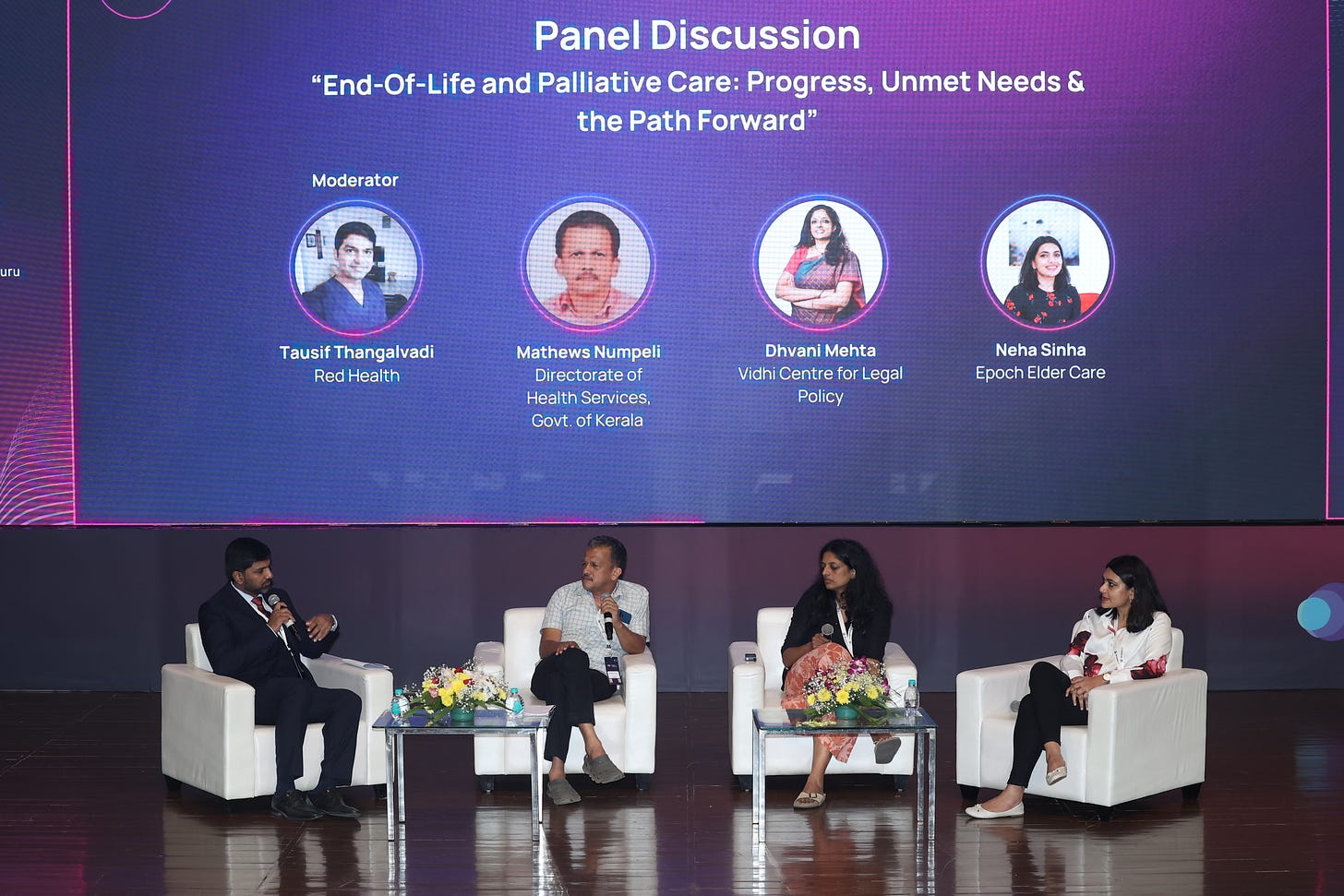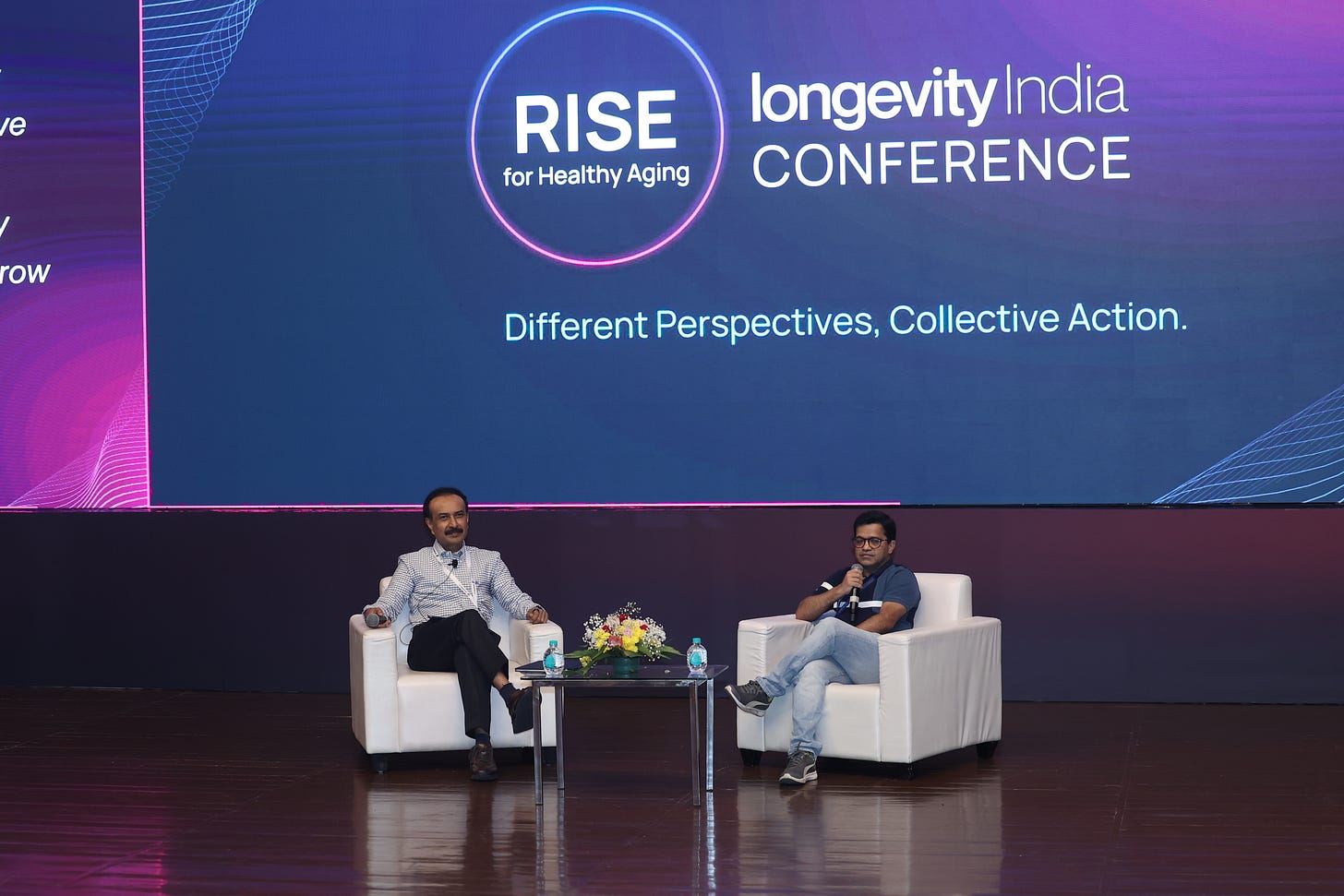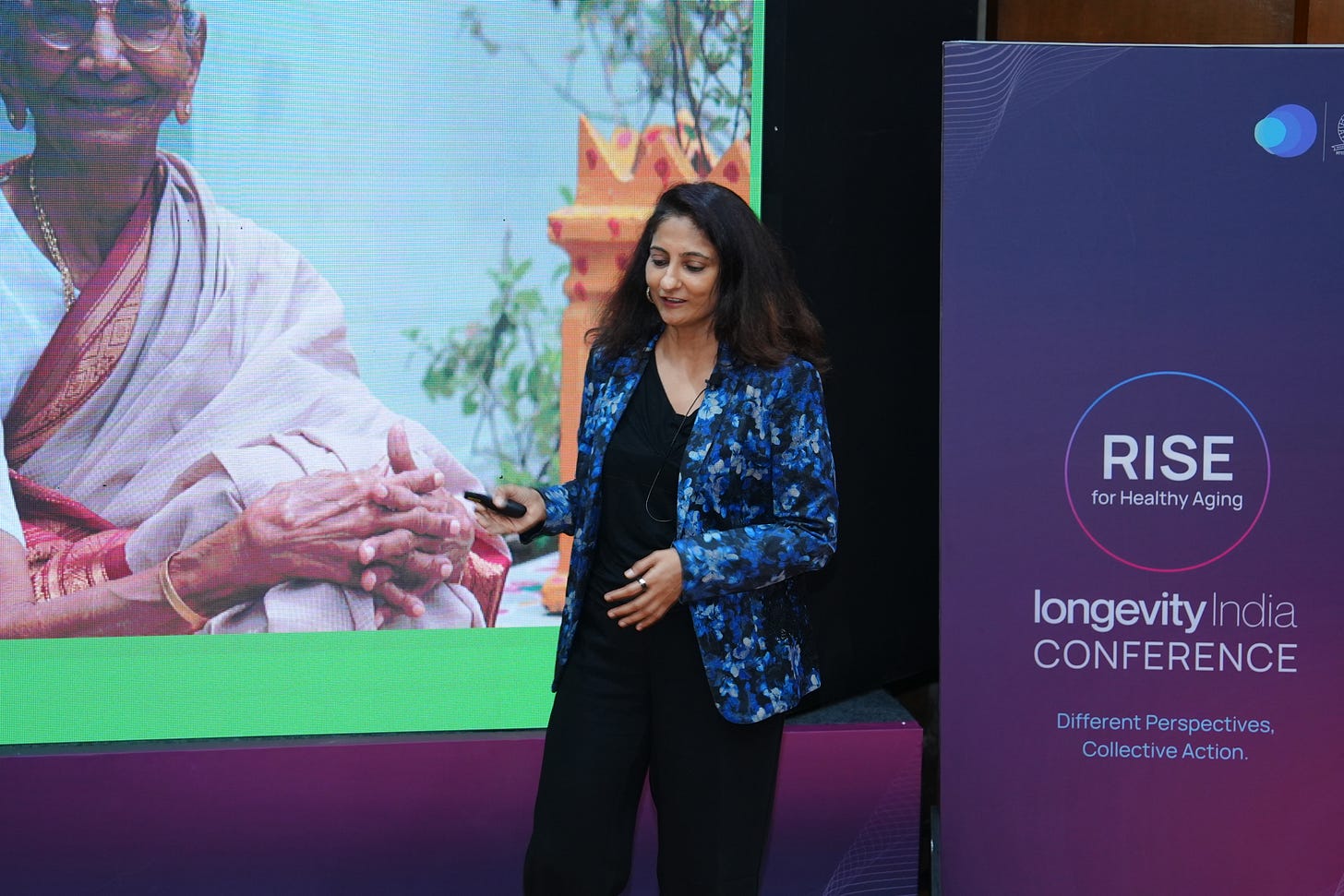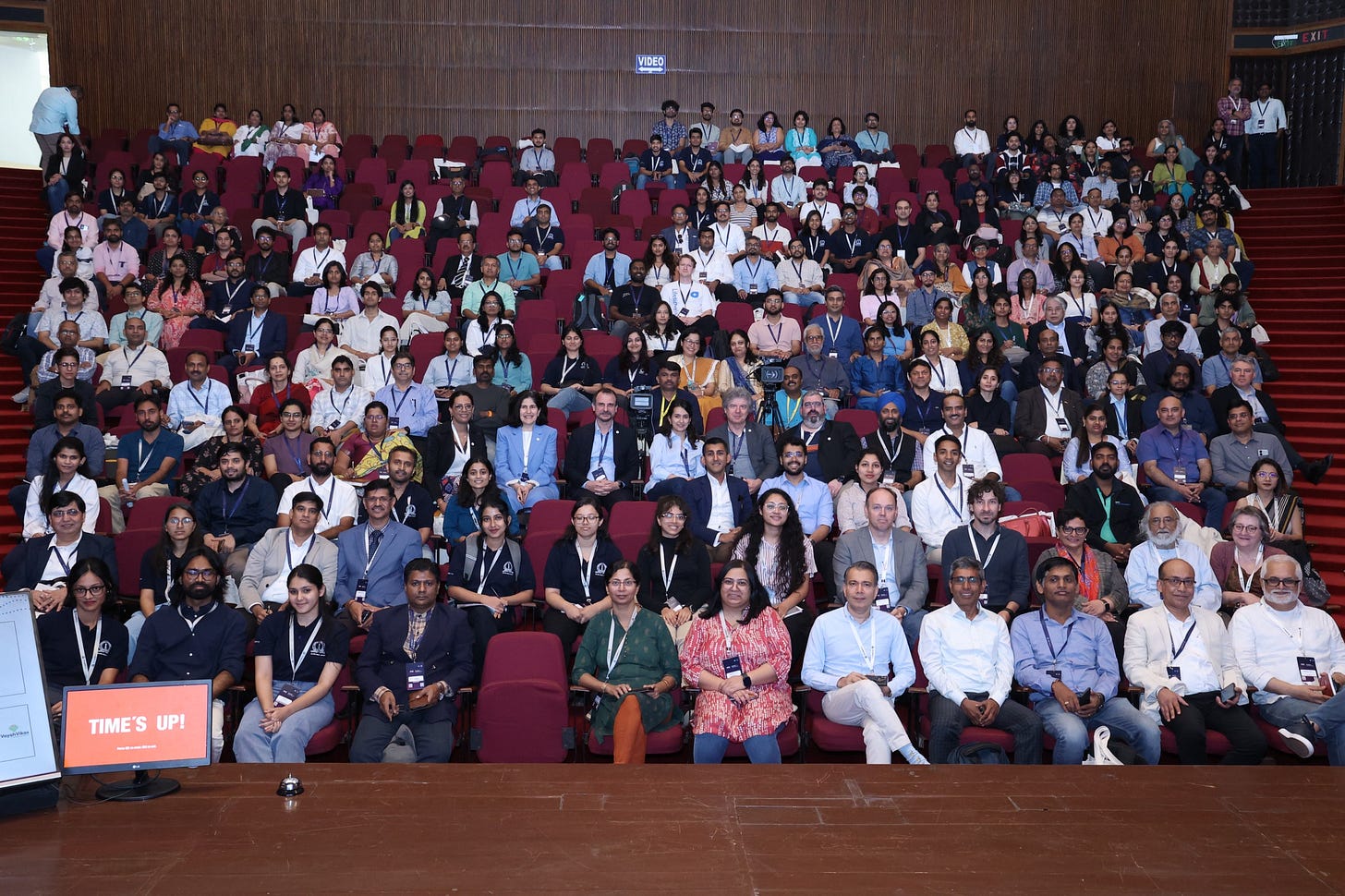Bridging Science, Society, and Care: RISE 2025 Day 3 - Special Issue
This issue captures the spirit of Day 3 of RISE 2025 that brought elder care, public health, and data-driven science into powerful dialogue—spotlighting India's unique aging challenges
With the energy of the past two days still resonating through the halls, the final day of the conference opened on a high note. With energized discussions and deeper cross-sectoral engagement, Day 3 brought policy, elder care, and public health to the forefront alongside scientific research, framing them within the Indian context while scientific sessions continued in parallel.
Elder Care, Policy, and Public Health
Dr. M.R. Rajagopal (Pallium India) delivered a powerful keynote drawing attention to the urgent gaps in palliative care access in India—where fewer than 4% of those in need receive appropriate support. He emphasized the financial toll of healthcare, with 55 million Indians pushed below the poverty line annually due to catastrophic health costs, and highlighted the ongoing disconnect between vision and reality. Highlighting the work of Pallium India, he emphasized the need for community-based care, public education, and policy change. His message concluded with a striking reflection from Dr. Sankha Mitra: “The poor die in misery of neglect, the middle class in ignorance, the rich on ventilators—no one gets a pain-free, dignified death.”

In the panel that followed, Technologies for Seniors and Caregivers, experts explored the growing role of digital tools in elder care. Moderated by Mr. Neeraj Sagar (Wisdom Circle), the discussion featured Dr. Arvind Mathur (Caregivers Asha Society), Dr. Manish Arora (IISc), and Mr. Anurag Ram Chandran (Kubo Care). Together, they examined innovations such as contactless fall detection and assistive technologies, while emphasizing the importance of thoughtful, user-centered implementation. Panelists stressed that the clinician’s role is to discern “who truly benefits from digital interventions,” warning that tech is not a one-size-fits-all solution. Key insights included: design must be user-centered, problems tackled should be common and solvable, and tools must be integrated—“users don’t want 10 different apps to tell them 30 different things.”
Complementing the previous session, the End-of-Life and Palliative Care panel explored community-based care models being pioneered in Kerala. Moderated by Dr. T.T. Tausif Thangalvadi (Red Health), the panel brought together Dr. Mathews Numpeli (Government of Kerala), Ms. Dhvani Mehta (Vidhi Centre for Legal Policy), and Ms. Neha Sinha (Epoch Elder Care). The discussion shared how their teams, in collaboration with the state government, are working to move palliative care beyond hospitals and into the heart of communities.
Echoing the WHO’s stance that palliative care should begin at the onset of serious suffering—not just end of life—they described how empowering communities to identify and support individuals based on mobility and illness transforms care. “Every person instinctively wants to help others,” noted Numpeli, stressing that communities need guidance, not persuasion. Dr. Thangalvadi emphasized the need to involve broader society, and panelist Neha Sinha shared how her journey led her to formal training in palliative care ethics to better support families, elders, and doctors alike.
The "Frameworks for Healthy Aging" session spotlighted the pivotal national studies - Longitudinal Aging Study in India (LASI) and the Indian Study of Healthy Ageing (ISHA). LASI, the largest survey of its kind in India, provides critical longitudinal data on the health, economic, and social well-being of older adults, shaping evidence-based policy. Complementing this, ISHA offers a more focused exploration of functional ability, care needs, and community health infrastructure, aiming to inform locally grounded interventions for aging populations. These initiatives are proving indispensable for understanding India's diverse aging population. They provide the vital data needed to shape evidence-based policies and propel healthy longevity initiatives into the future.
Alongside policy-focused discussions, day 3 had key scientific sessions, which are important to transforming longevity.
In the Data Sciences for Longevity session, Mr. Prashanth Prakash (Accel India) opened with a fireside chat emphasizing, “We equate AI to LLMs—a lot of challenges come from this misconception.” Speakers advocated for integrating classical AI-ML with knowledge-based systems and maintaining control and explainability. As one noted, “Medicine 4.0 can’t exist without AI—since AI is real, Medicine 4.0 will be real,” underscoring AI’s vital role in the future of personalized healthcare.
Dr. Marcus Ranney (Human Edge) illuminated how machine learning is revolutionizing longevity medicine. He passionately articulated that AI isn't here to replace doctors, but to augment them, making personalized and preventive care both scalable and accessible. By seamlessly integrating diverse health data—from digital inputs to blood and functional biomarkers—into a powerful AI system, we can transform passive health tracking into active, adaptive coaching.
These talks collectively showcased how advanced data analytics and AI are revolutionizing longevity research and healthcare delivery.
Additionally, parallel sessions offered valuable insights into the science and innovation shaping the future of aging. One session focused on clinical and cohort studies, highlighting plasma and microbiome markers for sarcopenia, frailty-related proteomic signatures, menopause trends, and age-spanning biomarker protocols. Another explored cellular, systemic, and lifestyle mediators such as mitochondrial dysfunction, genetic variants, holistic health models, and community-based care.
Two impactful workshops at the conference offered deep, actionable insights into personalized strategies for healthy aging. The first, "The Physicality of Aging and the Impact of Hormones through the Lifespan," led by Dr. Anuja Chandrana and Ms. Elena Panzeri, focused on women’s healthspan. Participants underwent assessments of grip strength, balance, frailty, and pelvic floor health, gaining individualized scores and tools to enhance strength and resilience. Elena’s session explored the gut-brain axis, hormone balance, and nutrition across life stages—highlighting how estrogen, cortisol, and the microbiome influence longevity, muscle preservation, and cognitive health. Attendees left with a personalized physical longevity toolkit and a roadmap to optimize movement, nutrition, and hormonal health.
In parallel, the Deep Holistics Workshop offered a systems-level view of aging through five core pillars: inflammaging, metabolism and oxidative stress, cardiovascular health, muscle and skin aging, and cognitive function. Led by Dr. Vishal Rao, Ms. Rina Baliga, and Dr. Harshavardhan Rao, the session combined expert talks with live workshop data and Deep Holistics’ clinically validated insights. Together, these workshops emphasized that the future of longevity lies in understanding the interplay between biology, lifestyle, and personalization—empowering individuals to take charge of their health journey with science-backed clarity.
The afternoon featured sessions on skin aging and technological approaches to healthy aging. Topics included photoaging research, lysosomal roles, anti-aging serums, and L'Oréal’s molecular research. The day concluded with presentations on personalized wellness platforms, glycation monitoring, cognitive health apps, and tools like flow cytometry for studying cellular senescence—underscoring the conference’s focus on integrating science, tech, and care for healthy longevity.
The Longevity Conference set the stage for a future where aging is not just about adding years to life, but life to years. It sparked conversations that blurred the lines between science, society, and care—reminding us that longevity is as much about connection and compassion as it is about technology and policy. As we look ahead, this is just the beginning of a much larger movement. With momentum on our side, we’re excited for what’s to come—new ideas, bold collaborations, and innovative frameworks that will redefine what it means to grow older in India and beyond.











